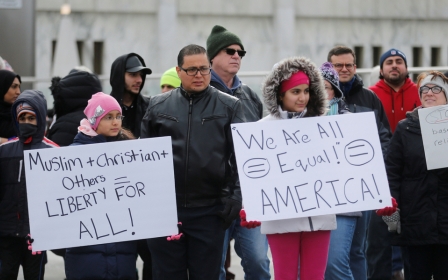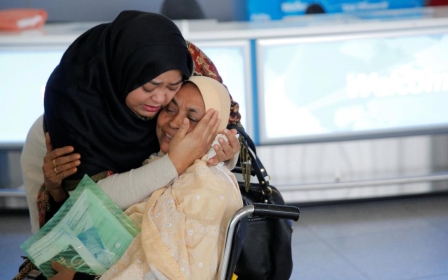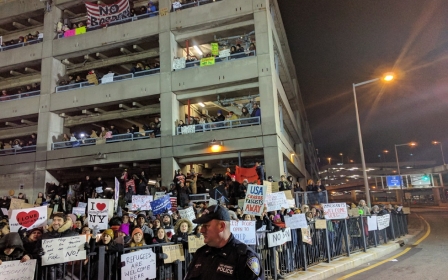'I feel scared for my kids': Islamophobia in New York 'worse than after 9/11'
NEW YORK CITY, United States - Muslims in New York City say they are facing “extreme” Islamophobia that is worse even than anything they experienced even in the aftermath of the 9/11 attacks on the city by al-Qaeda hijackers in 2001 that killed nearly 3,000 people.
Muslim communities have been shaken by the introduction of US President Donald Trump’s executive order banning travellers from seven Muslim-majority countries from entering the country for 90 days.
A deadly attack by gunmen on a mosque across the Canadian border in Quebec City on Sunday and an arson attack on a mosque in Texas on Saturday have also heightened unease, despite a wave of support that has also been expressed for Muslim communities.
“Honestly, a lot of us are exhausted trying to combat Islamophobia since 9/11 but now things have reached a totally new extreme, with the political rhetoric that has been going on since the elections,” Hebh Jamal, a Palestinian-American high school student, told MEE.
Jamal’s parents emigrated to North America almost 20 years ago, living briefly in Canada where she was born, before settling in New York. Growing up in the aftermath of 9/11, she said she had lived her entire life defending her religion and headscarf.
'I really feel scared living here with my family and kids' - Hiba Ramadan, New York
“This sort of discrimination is not new and I faced it on the train and the streets of New York, so much that it has become normal to be stared at for looking Muslim,” she said. “Whenever I am riding the subway, I make sure I am not standing near the tracks and basically watch out for myself.”
New York city’s Mayor Bill de Blasio has stressed that his city remains welcoming towards Muslims and assured local communities of his support in times of fear and uncertainty, tweeting: “To my fellow New Yorkers who are Muslim: New York City will protect you. The NYPD will protect you. We will fight all hatred and bias.”
The city has also been a focus for protests drawing thousands of people against the travel ban, both in Manhattan and at JFK Airport, with civil rights activist Linda Sarsour tweeting video of crowds with the message: "New York City always makes me proud."
But new arrivals in New York also said they were concerned about their safety.
Hiba Ramadan, a mother of three children, moved to New York from Egypt just two months ago.
“At this moment, I really feel scared living here with my family and kids,” Ramadan told MEE. “I like to go for Friday prayers with my kids and now with everything happening here in this country and around, I don’t feel so safe.”
America has seen a rise in hate crimes, vandalisation of mosques and Islamophobia, explained Rabiah Ahmed, director of media and public affairs at the Muslim Public Affairs Council (MPAC).
READ: Muslim Americans fearful of Trump ban but heartened by protests
“The divisive rhetoric that is coming from our national leaders is very concerning,” Ahmed told MEE, adding that “when it comes from people at that level, it gives out a message that Islamophobia and bigotry is tolerated and it emboldens people on the ground to act on their hate”.
Inter-faith unity
Many inter-faith leaders have come out and spoken in support of the Muslim community in America. Rabbi Marc Schneier, president of the Foundation for Ethnic Understanding, said he was trying to raise awareness within the American communities about the “invaluable contributions of American Muslims to this continent”.
'America has no bigger ally than Muslims in standing up to the forces of extremism, fanaticism and terrorism' - Rabbi Marc Schneier
“American Muslims have been at the forefront of combating ISIS and other terrorist organisations in the world and they have been very vocal in their opposition to such forces,” said Rabbi Schneier.
“I am upset and dismayed at what is taking place now, but it has only intensified my commitment to educate people that America has no bigger ally than Muslims in standing up to the forces of extremism, fanaticism and terrorism.”
In August 2016, Muslim communities in New York were shocked at the murder of an imam in the borough of Queens which is home to between 300,000 to 400,000 Muslims from all over the world.
Imam Alauddin Akonjee was shot in the head while he was walking on the streets with his assistant after finishing afternoon prayers.
Imam Shamsi Ali, who leads the Jamaica Muslim Centre, the largest Muslim community centre in New York, said he was concerned that places of prayer in the city could also become the targets of the type of attack that occurred in Quebec City.
“Canada is quite open and inclusive to immigrants and Muslims and if such an incident could happen in Canada, then I’m sure what we are facing in America is far worse,” Imam Ali told MEE.
“However, we are relieved and really appreciative and thankful to the support received from our mayor and NYPD [New York Police Department],” he said, adding that “I would advise the local Muslim community to stay calm in times of challenge as we are protected under the US constitution”.
READ: ressure mounts for Trump to reverse executive order as crisis deepens
Jamal told MEE that she had “learned to politicise at a very young age”.
“I have been to all the protests in the past few weeks and I don’t want to be anywhere else except on the streets and nothing else matters until people are helped,” she added, referring to the travel ban, which many also regard as a “Muslim ban”.
The ban restricts entry to the US of people from Iraq, Syria, Iran, Libya, Sudan, Somalia and Yemen, at least for another 90 days.
Akhter Husaen has been involved with the Muslim community in Jamaica for the last eight years. He moved there from Bangladesh nearly 29 years ago and now considers America his only home.
“After seeing the news in the past few weeks, I was telling my wife that look, how many people who are not Muslims have stood up for us, shown us support and despite all the backlash and political rhetoric, I am not going anywhere. I am American and I belong here.”
Middle East Eye propose une couverture et une analyse indépendantes et incomparables du Moyen-Orient, de l’Afrique du Nord et d’autres régions du monde. Pour en savoir plus sur la reprise de ce contenu et les frais qui s’appliquent, veuillez remplir ce formulaire [en anglais]. Pour en savoir plus sur MEE, cliquez ici [en anglais].




